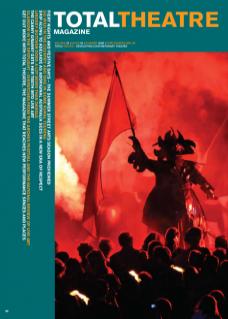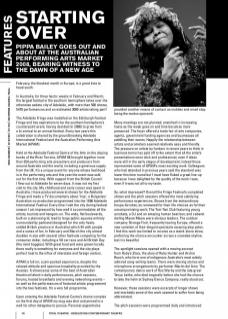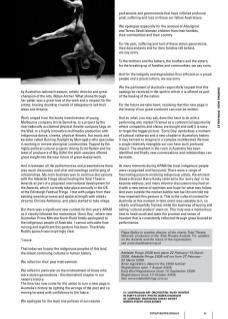February, the bleakest month in Europe, is a great time to head south.
In Australia, for three hectic weeks in February and March, the largest festival in the southern hemisphere takes over the otherwise sedate city of Adelaide, with more than 500 shows, 5470 performances and an estimated 3000 artists taking part!
The Adelaide Fringe was modelled on the Edinburgh Festival Fringe and has aspirations to be the southern hemisphere’s counterpoint event, having decided (in 2006) to grow from a bi-annual to an annual festival. Every two years this celebration is shared by the groundbreaking Adelaide International Festival and the Australian Performing Arts Market (APAM).
Held at the Adelaide Festival Centre of the Arts on the sloping banks of the River Torrens, APAM 08 brought together more than 550 performing arts presenters and producers from around Australia and the world, including a generous supply from the UK. It’s a unique event for anyone whose livelihood is in the performing arts and this year the event was sold out for the first time. With support from the British Council I flew out to Adelaide for seven days. It was not my first visit to the city. My childhood and early career was spent in Australia, I have produced several shows for the Adelaide Fringe and made a TV documentary about ‘Inje’, a Bulgarian/ Australian co-production programmed into the 1996 Adelaide International Festival. Every time I visit the city during festival season I am impressed by how well it accommodates all the artists, tourists and hangers-on. The wide, flat boulevards, built on a planned grid, lead to large public squares entirely surrounded by parkland (designed for the only freelysettled British province in Australia) which fill with people and a sense of fun. In February and March the city almost doubles in size with several other festivals competing for the consumer dollar, including a V8 car race and All British Day (the mind boggles). With great food and wine grown locally there really is something for everyone and the city plays perfect host to the influx of interstate and foreign visitors.
APAM is full on; a jam-packed experience, despite the relaxed attitude and spacious hospitality provided by the Aussies. It showcases some of the best of Australian theatrical talent in daily performances, pitch sessions, forums, hosted breakfasts and evening networking events – as well as the performances of featured artists programmed into the two festivals. It’s a very full programme.
Upon entering the Adelaide Festival Centre’s drama complex on the first day of APAM my mug was shot and pinned to a wall for other delegates to peruse. Personal pigeonholes provided another means of contact as mobiles and email stop being the modus operandi.
Many meetings are not planned, snatched in increasing haste as the week goes on and time becomes more pressured. The foyer offered a trade fair of arts companies, agents, government funding agencies and businesses all peddling their wares. Happily the relationship between artists and promoters seemed relatively easy and friendly. The pressure on artists by funders in recent years to think in business terms has paid off to the extent that all the artist’s presentations were slick and professional, even if ideas were still in the early stages of development; indeed these represented some of APAM’s most exciting work. Colleagues who had attended in previous years said the standard was lower this time round but I must have fluked a great line-up because I was delighted by the quality of the work I saw, even if it was not all to my taste.
So, what impressed? Overall the Fringe Festival’s completed shows and the pitch sessions offered the most satisfying performance experiences. Shows from the extraordinary troupe Acrobat, as renowned for their life choices as for their uncompromising work; The Tom Tom Club featuring young acrobats, a DJ and an amazing human beat box; and cabaret darling Meow Meow were obvious leaders. The outdoor company Strange Fruit, frequently touring Europe, offered a new variation of their elegant spectacle swaying atop poles. I find this work too limited to receive as a stand-alone show, preferring the chance encounter across a crowded skyline, but it is beautiful.
The spotlight sessions opened with a moving excerpt from Ruby’s Story, the story of Ruby Hunter and Archie Roach, who form one of indigenous Australia’s most widely admired song-writing teams. There were moving stories and microphone arrangements by performer Martin del Amo. The contemporary dance work of Ros Warby and the late great Tanya Leitke, who died tragically before she had the chance to take the helm at Sydney Dance Company, really stood out.
However, these sessions were excerpts of longer shows and inevitably some of the work seemed to suffer from being abbreviated.
The pitch sessions were programmed daily and introduced by Australian national treasure, artistic director and great champion of the arts, Robyn Archer. What shone through her patter was a great love of the work and a respect for the artists, braving daunting crowds of delegates to sell their ideas and dreams.
Work ranged from the kooky inventiveness of young Melbourne company Uncle Semolina, to a project by the internationally acclaimed physical theatre company Legs on the Wall, to a highly innovative multimedia production with indigenous dance, cinema, physical theatre, live music and karaoke called Burning Daylight by Marrugeku who specialise in working in remote aboriginal communities. Topped by the highly political cultural projects driving Scott Rankin and his team of producers of Big (h)Art the pitch sessions offered great insight into the near future of great Aussie work.
And in between all the performances and presentations there was much discussion and chat and meetings and forging of relationships. My main business was to continue discussions with the Adelaide Fringe about hosting the Total Theatre Awards as part of a proposed international development for the Awards, which currently take place annually in the UK at the Edinburgh Festival Fringe. I met with judges from their existing awards process and spoke at length with artistic director, Christie Anthoney, and plans started to take shape.
But there was a significant new context for this year’s APAM as it closely followed the momentous ‘Sorry Day’, where new Australian Prime Minister Kevin Rudd finally apologised to the indigenous people of Australia. I cannot articulate how moving and significant this gesture has been. Thankfully Rudd’s speech was inspiringly clear:
‘I move
That today we honour the indigenous peoples of this land, the oldest continuing cultures in human history.
We reflect on their past mistreatment.
We reflect in particular on the mistreatment of those who were stolen generations - this blemished chapter in our nation’s history.
The time has now come for the nation to turn a new page in Australia’s history by righting the wrongs of the past and so moving forward with confidence to the future.
We apologise for the laws and policies of successive parliaments and governments that have inflicted profound grief, suffering and loss on these our fellow Australians.
We apologise especially for the removal of Aboriginal and Torres Strait Islander children from their families, their communities and their country.
For the pain, suffering and hurt of these stolen generations, their descendants and for their families left behind, we say sorry.
To the mothers and the fathers, the brothers and the sisters, for the breaking up of families and communities, we say sorry.
And for the indignity and degradation thus inflicted on a proud people and a proud culture, we say sorry.
We the parliament of Australia respectfully request that this apology be received in the spirit in which it is offered as part of the healing of the nation.
For the future we take heart, resolving that this new page in the history of our great continent can now be written.’
And so what, you may ask, does this have to do with a performing arts market? Framed as a commercial opportunity where companies and shows are bought and sold it is easy to forget the bigger picture. ‘Sorry Day’ symbolises a moment of cultural catharsis and a new chapter in Australia’s history. It may be hard to imagine in a complex multifaceted life how a single relatively intangible act can have such profound impact. The elephant in the room in Australia has been identified and finally new conversations and relationships can be made.
At many moments during APAM the local indigenous people were recognised and honoured. There were a range of fascinating projects involving indigenous artists, the eminent theatre director Barry Kosky referred to the ‘sorry day’ in his keynote address, and many informal discussions touched on it with a new sense of optimism and hope for what may follow. And even outside the market bubble two taxi drivers told me how important this gesture is. This is the cultural context for Australia at this moment in time and it was valuable to it, so clearly and hopefully framed, while the business of buying and selling ‘cultural product’ went on. This truly was a momentous time to head south and taste the promise and sense of freedom that is consistently reflected through great Australian performance.
Pippa Bailey is creative director of the charity Total Theatre Network, producers of the Total Theatre Awards. For updates on the Awards and the future of the organisation, see www.totaltheatre.org.uk
Adelaide Fringe 2008 took place 22 February–16 March 2008. Adelaide Fringe 2009 will run from 27 February– 22 March 2009. Artist registration dates for the 2009 festival: Registrations open 1 August 2008. Early Bird Registrations close 10 September 2008. Registrations close 10 October 2008. See www.adelaidefringe.com.au


